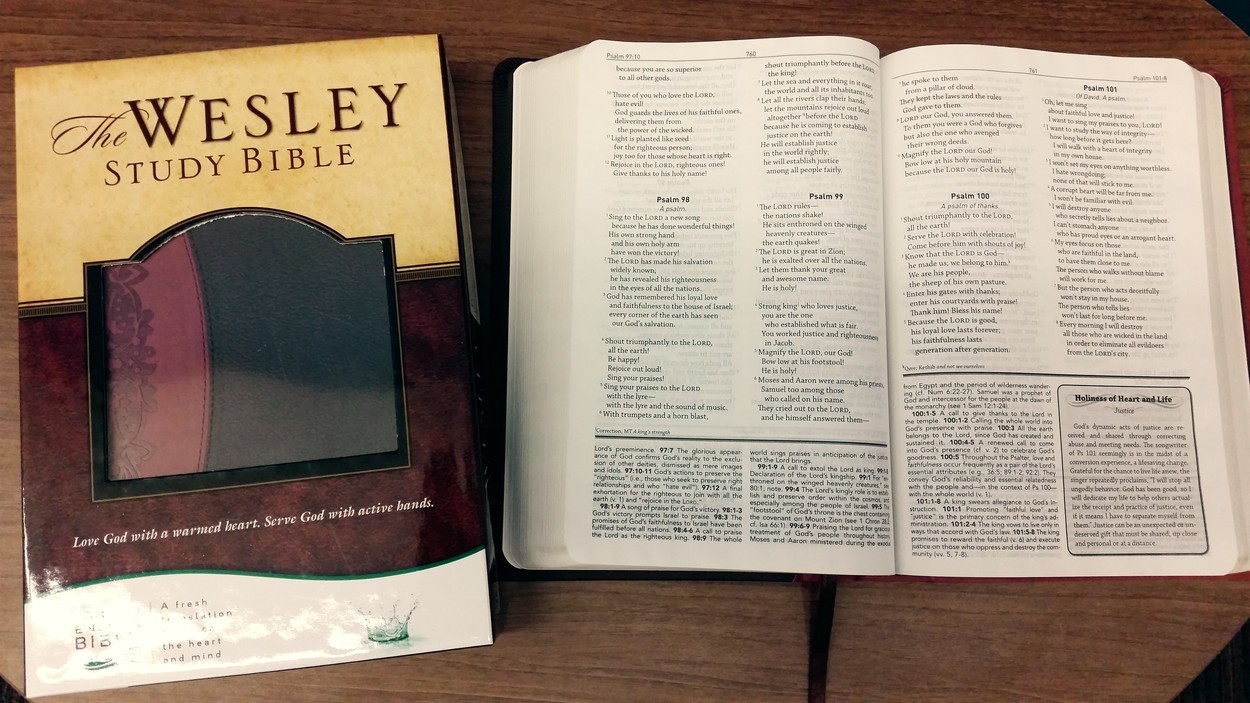
Not all habits are bad: Devotional from Rev. Jeffrey Vore

Rev. Jeffrey Vore
Walk through any bookstore and you will find a countless number of books on the topic of “self-help.” This is true not only in these stores, but it is also true for the online sellers of books. In the 90’s Amazon was developed and launched as a seller of books only. In their early years as a seller of books online, the topic of the most frequently purchased books was on the topic of “self-help.” The self-help or self-improvement topic is, today, a nine billion dollar industry. It is expected to grow to 14 billion dollars in just 2 years!
Many of us have read at least one book on the topic of self-improvement. In addition, we can name the book that influenced us the most. Perhaps it was the ever popular book written by Dale Carnegie, “How to Win Friends and Influence People.” Maybe it was “The Power of Positive Thinking” by Norman Vincent Peal.
Of course, the most popular self-help book that you have read is The Bible. It is the most widely read book throughout the world. And it provides countless goals and a road map for our living. Many of us can name our favorite author, as well as our favorite book found in the Bible.
Think with me for a minute. Do you have one or two books on the topic of self-help that has helped you throughout the years? What are the key points you found in this particular secular publication that has improved your life? What piece of writing have you looked toward in times of uncertainty?
What is the secular book, or author, that has influenced you the most throughout your life? Other than the Bible and its authors, who has helped you the most?

Wesley Study Bible
Consider, for a moment, the best-selling author on self-help and improvement, Dr. Stephen Covey. In his book, “The Seven Habits of Highly Effective People” Dr. Covey explains seven most important principles for us to follow. These principles are very common in those who have excelled in life.
Now, we could spend many hours identifying these habits. Today, we are focused on just one. It is the fifth principle or habit. Dr. Covey describes this habit as Seek first to understand, then to be understood.
In other words, know and deeply understand a person or concept BEFORE you begin to share with others. He explains this habit as one of the most important habits in effective communication. In this chapter, Dr. Covey explains the importance of listening as a necessary part of communication.
He states that most people do not listen to understand; they listen in order to reply. Most people are more concerned about what they want to say instead of listening to understand the other person. We have all seen this in other people. It can be very obvious the person is not hearing you or understanding your thoughts.
Writer, singer and Nobel prize winner, Bob Dylan says this in his song, A Hard Rain’s a-Gonna Fall. In the last verse he says:

Album cover for Bob Dylan's Freewheelin.
“And I’ll tell it, and speak it, and think it, and breathe it
And reflect from the mountain so all souls can see it
Then I’ll stand on the ocean until I start sinking
But I’ll know my song well before I start singing.”
Probably the greatest Christian in all the world, after Jesus, practiced this habit of Seek first to understand, then to be understood. After Saul was knocked off his horse while on his way to kill Christians in Damascus, he began this step. Once he regained his sight after 3 days of blindness, he began this principle. This is when Saul became known as Paul. This is when Jesus spent three years with Paul, teaching him everything he needed to know before he began his ministry.
We are also called to know our song well before we start singing. Just as Paul studied hard to know Jesus before he began his travels, we also are called to understand this greatest principle in the universe; to know Christ.
There is absolutely NOTHING that matters more in our lives than knowing Christ. Knowing Christ is the hope for the world. It is the primary and foundational message of the entire Bible.
In Ephesians 1:17 Paul states this greatest principle. “I pray that the God of our Lord Jesus Christ, the glorious Father, would give you the Spirit of wisdom and revelation in the knowledge of him.” (CSB) This is as true and meaningful today as it was at the time Paul wrote to the people of Ephesus in 50-60 AD.
It is so important today that we remember the central truth in all of history— that Jesus, the perfect LAMB of GOD, gave up his life in order to take away the sins of the world.
It is important to know that simply knowing Jesus as the Lamb of God who takes away the sins of the world is not full knowledge of Christ. The better we get to know Jesus as our Savior, the more we want Him to be in our lives. We want Him to be the Lord of our lives. But knowing Jesus as Lord means so much more than just following a bunch of rules. Jesus is not looking for rule-keepers.
Many of us have read books about an individual throughout history that we have admired. For example, let’s say you are a fan of the first person to walk on the moon. You will seek out and read books about Neil Armstrong in an effort to get to know him better. Even after reading the books you will know more about him, but that is all.
Now compare that to a relative of yours that you grew up with. The difference between these two people lies in the fact that you have been around your relative. You’ve talked with this person and spent time with them. You know their voice when you hear it. You know their personality as well as their strengths and weaknesses. You know the kinds of things they worry about. You know how reliable they are to keep their word and commitments. You know how honest they are. You know the kind of provider they has been for their family. You know what ticks them off. You know what things are the most important to them.

In other words, you know this relative. But you only know about Neil Armstrong. That’s true of most historical characters. We can know all kinds of things about them. But we have no way to really know them personally.
But Jesus is not just a person who lived in history. Jesus still lives today. Through His Spirit, Jesus Christ can have a very real and personal relationship with us. All this, and more, because that’s precisely how Jesus wants to be with us.
Remember in our scripture, Ephesians 1:17, Paul states, “I pray that the God of our Lord Jesus Christ, the glorious Father, would give you the Spirit of wisdom and revelation in the knowledge of Him.” (CSB) So, when Paul prayed for Christians to know Christ better, he was talking about a personal relationship kind of knowledge.
So, Dr. Covey’s number five of the seven habits of highly effective people also applies to our spirituality. When we seek to understand God, understand Christ, and understand the Holy Spirit, there is comfort in knowing that our Triune God wants the same with us. The more we learn about our God, the closer He becomes.
And the closer He becomes, the more we will begin to “Know our song before we start singing.” Found in the lyrics of a song written by Mark Hall of Casting Crowns where he states that it is our responsibility “to know Him and to make Him known.” Sound familiar?
Amen